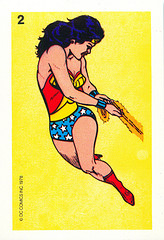The Amazonian myth
 |
| Amazon frieze by London Looks |
Great Women throughout History
However you look at it, the ancient Amazonians have come to symbolise the power of women to resist domination by men, even in that most manly of pursuits, war. Throughout history, women have proved their worth in terms of leadership and war, whether it was Boudica leading the ancient Britons in rebellion against the Roman invaders, Joan of Arc fighting back against the English or Yaa Asantewaa, who led the Ashanti rebellion against the British in Ghana, or the more diplomatic manoeuvres of Cleopatra, the Queen of Sheba, or Khoja Iparhan. That's not to mention the powerful women of world mythologies; Artemis, Kali, Oya, Marishi-Ten, Medhbh, Freyja, Ishtar and Vishpala, to name but a few!
Wonder Woman and the Amazons of Themyscira
 |
| Wonder Woman by Mark Anderson |
Lynda Carter, who played Wonder Woman in the TV series, is a fabulous-looking woman, of mixed Irish and Mexican heritage and was a former Miss World USA, which seems somehow at odds with her portrayal of Wonder Woman in the TV series. I guess readers of this blog who didn't grow up in the 70's or 80's, will relate more to Xena Warrior Princess, another modern Amazonian.
Brazil's own Amazonian Warrior
On the 1st of January this year (2011), Dilma Rousseff was inaugurated as Brazil's first female president. Despite being from a fairly affluent middle-class background, Dilma belongs to the Worker's Party of Brazil and has a fascinating life-story, starting out on her political career in the 1960's, as a young student Marxist revolutionary. She has been associated with Colina (Comando de Libertação Nacional), a far-left organisation that advocated guerrilla warfare against the state and she was captured by the Brazilian military in 1970 and allegedly tortured for 22 days.
Female World Leaders
 |
| President Rousseff by Agencia Brasil |
Dilma's father was Bulgarian and her election caused quite a stir in Bulgaria, which is also on the Black Sea and very close to the original 'homeland' of the ancient Amazonians! Other countries, including Ireland, have had female presidents in the past and I've counted 8 countries that currently have female presidents (not including countries like the UK, where Queen Elizabeth II is the nominal Head of State). This list includes; Finland, Liberia, India, Argentina, Lithuania, Kyrgyzstan, Costa Rica and Kosovo.
A further 10 countries have female Prime Ministers or leaders, including; Germany, Bangladesh, Iceland, Croatia, Trinidad and Tobago, Australia, Slovakia, Mali, Thailand and Denmark. It's interesting to note that the current list of female leaders is not as dominated by Europe and 'the West', as one might assume. Whilst it's great to see modern women around the world gain this level of political recognition, it's still only 18 countries out of 204 (recognised) states, which means more than 90% of the world's countries currently have men at the top of their political ladders.
Image credits:
The image of the frieze depicting an Amazonian woman was taken by flickr member London Looks, a native Tennessean who currently lives in South London. The original frieze can be seen at London's British Museum and you can see more of London Look's work at http://www.flickr.com/people/londonlooks/
The image of Wonder Woman is by cartoonist, Mark Anderson, who lives in the Chicago and has shared this image via Flickr. You can more of Mark's work on his website.
Thanks to London Looks and Mark Anderson for sharing these images with us using the Creative Commons License.
The image of Dilma Rousseff, the current President of Brazil, is from Wikimedia Commons and has been released as the official photo of Brazil's president by Agência Brasil. My use of this image to illustrate my blog post does not mean than my blog is endorsed in any way by the image creator. You can see a full description of the Image's origin at its wikimedia page.

No comments:
Post a Comment